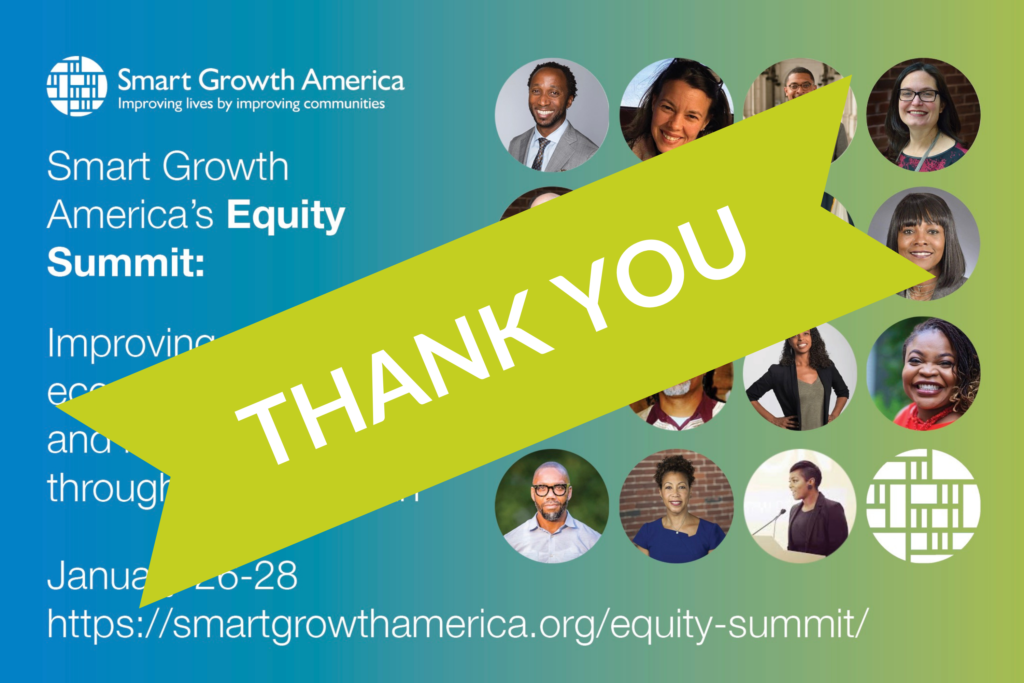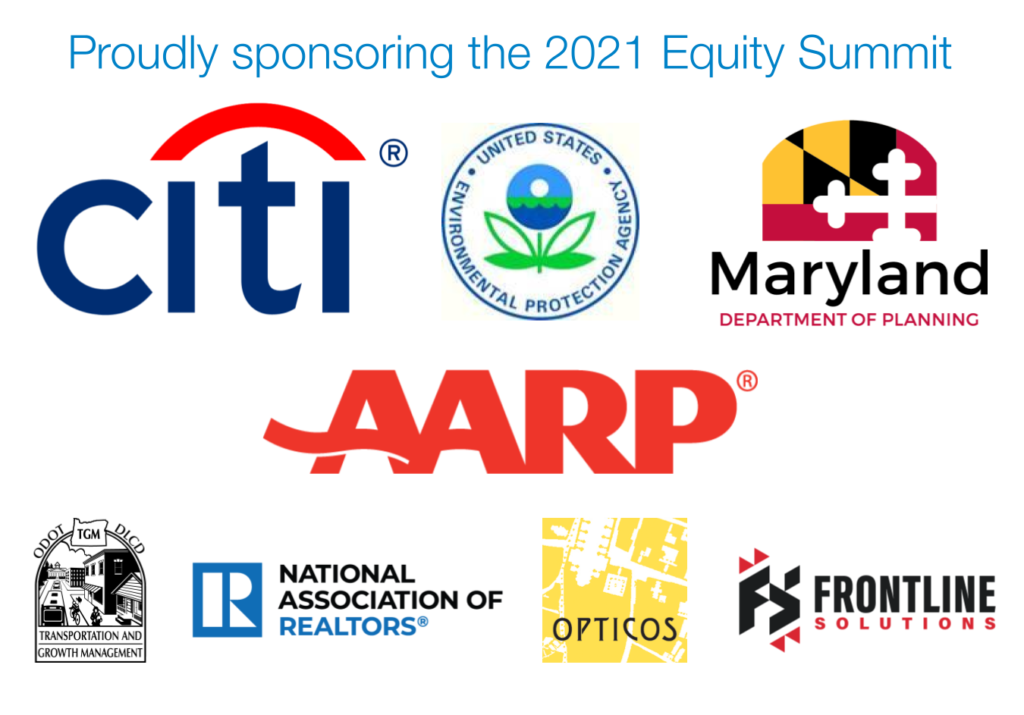
News
By Helen Hope, February 10, 2021

Smart Growth America’s first-ever Equity Summit was filled with an impressive lineup of speakers discussing how to promote equity in housing and land use, why strong Black and brown businesses are key to neighborhood vitality, and how to right the wrongs of past damaging transportation decisions and promote restorative justice. Here are just a few of the highlights.
Nearly 3,000 attendees tweeted, asked thoughtful questions, and shared about their desire to continue the conversations in their own work. You can watch or listen to the entire three days of the Summit on the Summit’s home page.
Smart Growth America’s President and CEO Calvin Gladney kicked off the Summit by grounding the three days with a reminder of what smart growth is: a map, a mindset and—most importantly—a movement.
A map to get to the place we want to be: mixed use, affordable, beautiful
A mindset to think about where we build, how do we ensure land-use zoning and economic development happens in a fiscally-responsible way
A movement to make equitable outcomes part of the goals of our work
The keynote speaker on the first day was Dr. Andre Perry, a Fellow at the Brookings Institution Metropolitan Policy Program, scholar-in residence at American University, and author of Know Your Price: Valuing Black Lives and Property in America’s Black Cities. Dr. Perry laid the foundation for the whole Summit and got our minds turning with a presentation on his research, setting the stage for the following panel discussion on why the U.S. needs a top-to-bottom reset of its development, investment, and land use paradigms to not only prevent displacement, but to include all Americans in our economic future.
Dr. Perry provided a mic drop moment that was referenced throughout the rest of the Summit while explaining the unrealized economic and societal gains to be had by boosting black business growth. “Equity is stimulus. If you want to improve the economy, support equity,” Dr. Perry said.
“If Black businesses were the equivalent of the Black population, there would be more than 800,000 more Black businesses”
– Dr. Andre Perry
The panel that followed Dr. Perry explored how communities can leverage systems-wide change to plan for success, build equity, and create value in their built environment and lived experiences.
Moderator: Jair Lynch, President, LOCUS
- Mayor Joseph Curtatone, Somerville, MA
- Chase Cantrell, Executive Director, Building Community Value
- Sekita Grant, Vice President of Programs, The Solutions Project
On the second day, the Summit focused on how Black and brown businesses directly contribute to the vibrant, livable and resilient communities that the smart growth movement aims to create, and how the success of these businesses are key to achieving racial equity and economic inclusion. But how can smart growth advocates better support these businesses? What do they need to prosper? The panelists discussed the supportive infrastructure and tools needed to better support Black and brown-owned businesses, like access to capital, better municipal and ecosystem support, and policy reforms. Watch one of the highlights below:
Moderator: Calvin Gladney, President and CEO of Smart Growth America
- Councilmember Kenyan R. McDuffie, District of Columbia Council.
- Jasmine Thomas, Senior Vice President of US Business Partnerships, Citi. Jasmine leads Citi’s $1B Action for Racial Equity initiative.
- Dr. Andre M. Perry, making a second appearance.
The third and final day of the summit was kicked off by Transportation for America’s Beth Osborne who jump started the conversation by unpacking T4A and Third Way’s recent policy proposal on how the federal government can start to undo the damage of “urban renewal” projects, like the construction of the Interstate Highway System that displaced millions of Americans and especially harmed communities of color and continues to do so today. Not only did the presentation hit some key points on racial inequities, it displayed some pretty stark imagery collected through a Twitter thread from Calvin Gladney a few months ago.
The panel that followed gathered a state government leader, on-the-ground activist, and an urban planning thought leader in a room (albeit virtual) to discuss how communities are addressing disparities caused by highways and how to select and design transportation projects today to ensure it never happens again. With the Rondo neighborhood at the forefront, the discussion focused on the why and how bringing communities into the development process earlier can benefit both community and infrastructure decisions.
Moderator: Beth Osborne, Director of Transportation for America
- Dr. Destiny Thomas, Founder and CEO of Thrivance Group
- Melvin Giles, community leader and advocate in the Rondo neighborhood in St. Paul, MN.
- Minnesota State Representative Rena Moran
Pulling from the organic conversations between panelists, we’ll be producing some discussion guides and other resources for attendees to share with their workplace, book club, friends, or family.
We’ll also be back soon with some reflections from our staff about what we learned, and ways that we’ll be incorporating what we heard into our work.
Interested? Sign up for updates here.
Watch or listen to all three days of the Equity Summit at www.smartgrowthamerica.org/equity-summit.
Thanks to our sponsors below.

Related News

© 2025 Smart Growth America. All rights reserved
Site By3Lane Marketing








